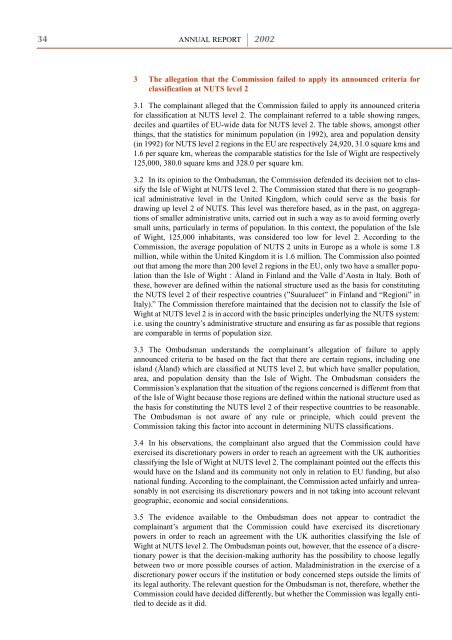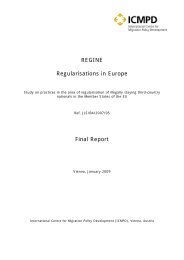Annual report 2002 - EOI
Annual report 2002 - EOI
Annual report 2002 - EOI
Create successful ePaper yourself
Turn your PDF publications into a flip-book with our unique Google optimized e-Paper software.
34 ANNUAL REPORT | <strong>2002</strong><br />
3 The allegation that the Commission failed to apply its announced criteria for<br />
classification at NUTS level 2<br />
3.1 The complainant alleged that the Commission failed to apply its announced criteria<br />
for classification at NUTS level 2. The complainant referred to a table showing ranges,<br />
deciles and quartiles of EU-wide data for NUTS level 2. The table shows, amongst other<br />
things, that the statistics for minimum population (in 1992), area and population density<br />
(in 1992) for NUTS level 2 regions in the EU are respectively 24,920, 31.0 square kms and<br />
1.6 per square km, whereas the comparable statistics for the Isle of Wight are respectively<br />
125,000, 380.0 square kms and 328.0 per square km.<br />
3.2 In its opinion to the Ombudsman, the Commission defended its decision not to classify<br />
the Isle of Wight at NUTS level 2. The Commission stated that there is no geographical<br />
administrative level in the United Kingdom, which could serve as the basis for<br />
drawing up level 2 of NUTS. This level was therefore based, as in the past, on aggregations<br />
of smaller administrative units, carried out in such a way as to avoid forming overly<br />
small units, particularly in terms of population. In this context, the population of the Isle<br />
of Wight, 125,000 inhabitants, was considered too low for level 2. According to the<br />
Commission, the average population of NUTS 2 units in Europe as a whole is some 1.8<br />
million, while within the United Kingdom it is 1.6 million. The Commission also pointed<br />
out that among the more than 200 level 2 regions in the EU, only two have a smaller population<br />
than the Isle of Wight : Åland in Finland and the Valle d’Aosta in Italy. Both of<br />
these, however are defined within the national structure used as the basis for constituting<br />
the NUTS level 2 of their respective countries (”Suuralueet” in Finland and “Regioni” in<br />
Italy).” The Commission therefore maintained that the decision not to classify the Isle of<br />
Wight at NUTS level 2 is in accord with the basic principles underlying the NUTS system:<br />
i.e. using the country’s administrative structure and ensuring as far as possible that regions<br />
are comparable in terms of population size.<br />
3.3 The Ombudsman understands the complainant’s allegation of failure to apply<br />
announced criteria to be based on the fact that there are certain regions, including one<br />
island (Åland) which are classified at NUTS level 2, but which have smaller population,<br />
area, and population density than the Isle of Wight. The Ombudsman considers the<br />
Commission’s explanation that the situation of the regions concerned is different from that<br />
of the Isle of Wight because those regions are defined within the national structure used as<br />
the basis for constituting the NUTS level 2 of their respective countries to be reasonable.<br />
The Ombudsman is not aware of any rule or principle, which could prevent the<br />
Commission taking this factor into account in determining NUTS classifications.<br />
3.4 In his observations, the complainant also argued that the Commission could have<br />
exercised its discretionary powers in order to reach an agreement with the UK authorities<br />
classifying the Isle of Wight at NUTS level 2. The complainant pointed out the effects this<br />
would have on the Island and its community not only in relation to EU funding, but also<br />
national funding. According to the complainant, the Commission acted unfairly and unreasonably<br />
in not exercising its discretionary powers and in not taking into account relevant<br />
geographic, economic and social considerations.<br />
3.5 The evidence available to the Ombudsman does not appear to contradict the<br />
complainant’s argument that the Commission could have exercised its discretionary<br />
powers in order to reach an agreement with the UK authorities classifying the Isle of<br />
Wight at NUTS level 2. The Ombudsman points out, however, that the essence of a discretionary<br />
power is that the decision-making authority has the possibility to choose legally<br />
between two or more possible courses of action. Maladministration in the exercise of a<br />
discretionary power occurs if the institution or body concerned steps outside the limits of<br />
its legal authority. The relevant question for the Ombudsman is not, therefore, whether the<br />
Commission could have decided differently, but whether the Commission was legally entitled<br />
to decide as it did.
















